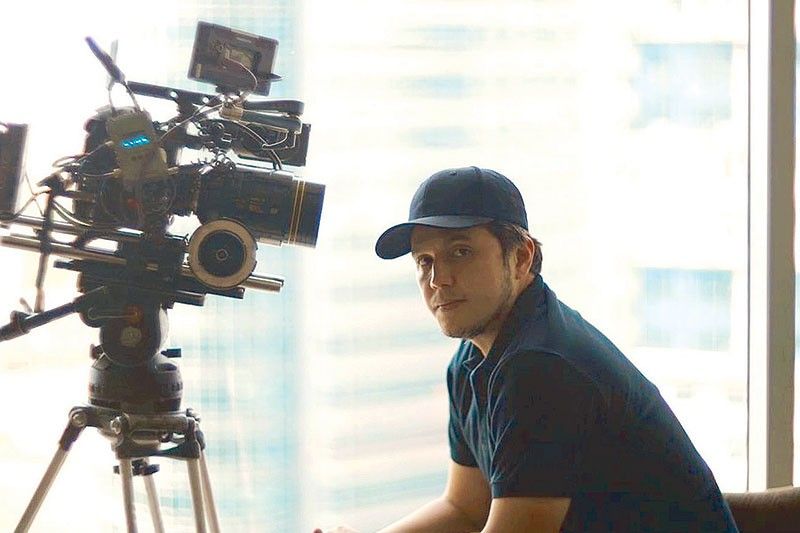Direk Paul Soriano gets ‘most personal’ in Real Life Fiction

Filmmaker Paul Soriano has created his “most personal” work yet in Real Life Fiction.
Starring Piolo Pascual and Jasmine Curtis-Smith, the psychological drama attempts to shed light on the psyche and limits to which actors push themselves and the people around them “to find brilliance in madness.”
Being a director for 15 years now has given Paul a frontrow seat to the lives of actors who create fiction for real. The director, who is also married to one, Toni Gonzaga, and the grandson of one, Nestor de Villa, has had opportunities to explore and observe what he called as the thin, blurry line that actors cross day in and day out.
His film is borne out of his observations on the methods and processes actors do when creating characters, and how these affect who they are and how they live their lives when cameras stop rolling.
Real Life Fiction is produced under Paul’s production house TEN17P with Spring Films and Viva Films. Its first official trailer will be released today, which is also the director’s 40th birthday.
“I’ve been fortunate and blessed to work with many different actors — some of the most popular ones, some of the better-known character actors and some first-timers. I got to know them personally and professionally,” direk Paul told The STAR in a recent virtual interview.
“I have the most respect for actors because technically their job is to be somebody else, to create a character that can convince strangers in a cinema and make them believe in their journey. It’s a very respectable thing to do because how do you separate yourself from real life and from fiction? There’s that blurred line that sometimes for some actors, there’s no more line and it becomes just them.”
Casting Piolo
In his film, Paul goes into the mind of an actor played by Piolo, whom he described as perfect for the role.
“He’s also had, what, 30-plus years in the industry, so his journey as an actor, as a character was also kind of a release for him. We got along and he was able to really encapsulate the character of Paco for Real Life Fiction.”
As the synopsis puts it, Paco is a seasoned actor surrounded by people who think they know who he truly is. In hopes of coming to terms with his own mortality and rediscovering who he really is and what he has become, Paco decides to write, direct and act in his own movie. In the course of doing so, he meets a new actress, Paula (Jasmine), who becomes his on and off-screen muse. She turns into all the characters he creates for her, from assassin, therapist to a woman he plans to marry.
As he relentlessly pursues his film, his ways put a strain on his relationship with Paula and take a toll on his life. As lines between what’s real and not are blurred, Paco is haunted by memories that push him to make a choice between finally ending his misery, or getting out of his head and forgiving himself.
Paul acknowledged that his film has a “very existential” nature, heavily influenced by the likes of Terrence Malick, François Truffaut, Federico Fellini — the masters he has studied or watched for inspiration.
The director also confirmed that the movie has a meta-quality to it in that “it is kind of like a film within a film because you actually see the making of the film. You also see bits and pieces of the film they’re shooting. It’s kind of what the structure of Real Life Fiction is.”
Most personal film
According to Paul, Real Life Fiction is 15 years in the making “because that’s kind of what I needed to be able to write something like this.”
“I think it’s definitely my most personal from a filmmaker’s perspective, just from my experiences. (It’s about) being a filmmaker for the past 15 years and what I got from it,” he further shared.
“I am very thankful, obviously, that I had the opportunity to do a film like this. It’s a little bit niche, it’s experimental...”
He began writing it in 2019 while attending the Tokyo Film Festival for his last film Mañanita and enjoying different cinematic works there.
On the day the country was put on a hard lockdown in March 2020, he was with Piolo in his office in Quezon City, pitching the concept. “He instantly gravitated towards the project, saying that’s kind of been his life and he signed on. He gave me this word that he’d do it. Then, the pandemic happened and I was able to write more.”
In August 2020, when things improved, they locked themselves in a bubble and shot the film for a month. It is now done but no release date yet. He is, however, definite about having it screened in cinemas.
Paul further said of his choice for a directorial comeback. “It just felt right. I never really know what my next film is. Like right now, if you ask me, I’m working on three or four films. There is one film that could be it. But I guess my next film is always whatever feels right, whatever organically happens well. Real Life Fiction all just came together. All the pieces were happening. Piolo said yes, Jasmine, yes, the team was okay, the location was okay, so game.”
Biggest change as director
From directing music videos and concerts, direk Paul ventured into full-length features starting in 2009 with A Journey Home. Citing his filmography, The STAR asked if it was his intention to take on varying genres.
“It’s funny that you say that, like, one of the next films I’m doing, it really does not coincide with any of my past films. I know there’s a tendency to brand certain filmmakers. But I guess with me, I just want to be branded to the kind of story I want to tell,” he said.
“It doesn’t necessarily mean that I always do a love story or drama or action or science fiction, but if there’s a story I can fall in love with and sacrifice possibly a year, or a year and a half of my life, then I think it’s worth-telling.”
Noting he’s not “genre-picky,” he added, “I love all kinds of films, from local to world cinema. I think my taste in films can go from ‘very shallow’ movies to what people consider critically-acclaimed. I keep an open mind, I think.”
Asked if he’s the type of director who, after every film, clinically looks at it and assesses what he could have done better, he said, “I think what every film I’ve done shows where I was at that particular moment in time of my life. Like when I did Thelma (2011), when I watch that film, I kind of know what I was thinking, what my inspirations were. Or when I did Kid Kulafu (2015), First Love (2018), Siargao (2017), (each film) brings me back to the Paul Soriano at that time. We’re all evolving, we’re all changing. We’re all hopefully getting better, learning from our mistakes. I would like to think every film that I do is kind of the best version of me at that particular moment.”
He continued, “The best part about making films is that it’s so subjective, to the point where you have really good discussions. And from those discussions, you get better.”
One thing’s certain, the biggest change in him as a filmmaker was brought about by the arrival of his son, Seve, five years ago.
“That brought out a whole plethora of emotions I had never felt before. I think for the first time, you literally can’t control anything. Toni said it best, that your heart is literally living outside your body. I never understood that until I had my own son. You can only do so much to give him the best and protect him as much as you can, but at the end of the day, you have to learn to slowly let them grow,” Paul reflected.
“That kind of emotion I have now as a father maybe has changed me also as a storyteller. I guess, I’m more sensitive. I’m very choosy with my projects because it means I’m going to be away from Seve. Is it worth to be gone for a month and miss milestones maybe or miss something? When I became a father, I kind of organically became more emotional, which I think as a filmmaker is very positive because you should feel empathy, you should feel sympathy, you should feel happy, sad.”
- Latest
- Trending

























 Exclusive
Exclusive


